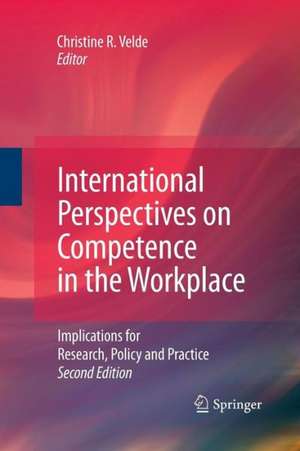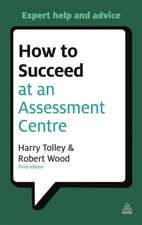International Perspectives on Competence in the Workplace: Implications for Research, Policy and Practice
Editat de Christine R. Veldeen Limba Engleză Paperback – 11 sep 2014
Providing the reader with insightful perspectives about competence in different situations and contexts, the book’s sections explore the concept of competence in industry and vocational education, in schools and colleges, in small businesses and companies, and in universities. The interpretation, experience and teaching of competence in the workplace is boiled down to five essential components that in themselves represent an argument for a more holistic conception of competence. Velde herself concludes the book by synthesizing and reflecting on the contents.
This book provides the reader with insightful perspectives on competence, and the characteristics of learning environments in different workplace contexts. Drawing on phenomenographic insights allows it to present a more enlightened view of competence, at the same time as opening up an international dialogue about the meaning and interpretation of competence in the workplace. Useful not only to educators and researchers, this volume will also assist leaders and managers in a variety of contexts to develop more meaningful workplaces.
| Toate formatele și edițiile | Preț | Express |
|---|---|---|
| Paperback (1) | 620.47 lei 6-8 săpt. | |
| SPRINGER NETHERLANDS – 11 sep 2014 | 620.47 lei 6-8 săpt. | |
| Hardback (1) | 626.49 lei 6-8 săpt. | |
| SPRINGER NETHERLANDS – 22 oct 2009 | 626.49 lei 6-8 săpt. |
Preț: 620.47 lei
Preț vechi: 729.96 lei
-15% Nou
Puncte Express: 931
Preț estimativ în valută:
118.74€ • 124.88$ • 99.21£
118.74€ • 124.88$ • 99.21£
Carte tipărită la comandă
Livrare economică 09-23 ianuarie 25
Preluare comenzi: 021 569.72.76
Specificații
ISBN-13: 9789400790544
ISBN-10: 9400790546
Pagini: 264
Ilustrații: XVII, 244 p.
Dimensiuni: 155 x 235 x 14 mm
Greutate: 0.37 kg
Ediția:2nd ed. 2009
Editura: SPRINGER NETHERLANDS
Colecția Springer
Locul publicării:Dordrecht, Netherlands
ISBN-10: 9400790546
Pagini: 264
Ilustrații: XVII, 244 p.
Dimensiuni: 155 x 235 x 14 mm
Greutate: 0.37 kg
Ediția:2nd ed. 2009
Editura: SPRINGER NETHERLANDS
Colecția Springer
Locul publicării:Dordrecht, Netherlands
Public țintă
ResearchCuprins
Competence in the Workplace: A Focus on Industry and Vocational Education.- Understanding of Work: The Basis for Competence Development.- Exploring Opportunities for Collaborative Linkages in the Vocational Education and Training (VET) Sector.- Workplace Competence: Integrating Social and Personal Perspectives.- Competence in the Workplace: A Focus on Schools and Colleges.- The Changing Context of Business Education: Competency Requirements for the New Paradigm.- Professional Competencies: Perspectives and Challenges for the Tertiary Sector.- Employers' Perceptions of Graduate Outcomes: A Case Study of a Private College in Shanghai.- Competence in the Workplace: A Focus on Small Business and Companies.- Workplace Trainers in Enterprises: Merging and Emerging Areas of Practice.- Developing Entrepreneurial Competencies Through Dilemma Reconciliation.- Learning Environments of Employees in Knowledge-Intensive Company Units.- Competence in the Workplace: A Focus on University and Global Contexts.- Intercultural Knowledge Management: A Competency Model for the Repatriation of Expatriates in the Asia-Pacific.- Local Needs, Global Contexts: Innovation and Excellence in Teaching in the Modern University.- Demands for Intercultural Communicative Competence in Working Life.- Conclusion.
Textul de pe ultima copertă
As the world’s economy develops into a more dynamic, fast-moving, and unpredictable entity, it is crucial that the workers who create wealth have the ability to assess and respond to new and unforeseen challenges. In other words, the future will require a more competent workforce. What, though, does this mean in practice? In this, the fully revised second edition of Christine Velde’s book, a variety of researchers from around the world provide a truly international perspective on the issue. They help to redefine the term competence. Rather than responding to challenges using a pre-existing set of skills, they see competence as having the ability to assess new situations, and then adapt one’s response accordingly, particularly in collaboration with others.
Providing the reader with insightful perspectives about competence in different situations and contexts, the book’s sections explore the concept of competence in industry and vocational education, in schools and colleges, in small businesses and companies, and in universities. The interpretation, experience and teaching of competence in the workplace is boiled down to five essential components that in themselves represent an argument for a more holistic conception of competence. Velde herself concludes the book by synthesizing and reflecting on the contents.
This book provides the reader with insightful perspectives on competence, and the characteristics of learning environments in different workplace contexts. Drawing on phenomenographic insights allows it to present a more enlightened view of competence, at the same time as opening up an international dialogue about the meaning and interpretation of competence in the workplace. Useful not only to educators and researchers, this volume will also assist leaders and managers in a variety of contexts to develop more meaningful workplaces.
Christine Velde, the editor, has published widely about the meaning and interpretation of competence in different workplaces. Her work has included the development of more holistic models of competence. More recently, Velde has expanded her research and writing interests to include the challenges to competence development across global contexts.
Providing the reader with insightful perspectives about competence in different situations and contexts, the book’s sections explore the concept of competence in industry and vocational education, in schools and colleges, in small businesses and companies, and in universities. The interpretation, experience and teaching of competence in the workplace is boiled down to five essential components that in themselves represent an argument for a more holistic conception of competence. Velde herself concludes the book by synthesizing and reflecting on the contents.
This book provides the reader with insightful perspectives on competence, and the characteristics of learning environments in different workplace contexts. Drawing on phenomenographic insights allows it to present a more enlightened view of competence, at the same time as opening up an international dialogue about the meaning and interpretation of competence in the workplace. Useful not only to educators and researchers, this volume will also assist leaders and managers in a variety of contexts to develop more meaningful workplaces.
Christine Velde, the editor, has published widely about the meaning and interpretation of competence in different workplaces. Her work has included the development of more holistic models of competence. More recently, Velde has expanded her research and writing interests to include the challenges to competence development across global contexts.
Caracteristici
A revised and updated 2nd edition Updated to meet current trends in the field; and the broader socio, economic, political and global issues, in order to retain its holistic strengths Forward thinking, in presenting an enlightened conceptualisation of competence for future workplaces, where workers will be required to predict and deal with novel situations at work Ahead of its time, in furthering an international dialogue about the impact of culture, the need for effective intercultural communication, and the challenges of globalisation for workplaces across international contexts, e.g. the West: Australia and Europe, and the East: China, Singapore, Hong Kong The structure of the book around four major themes is based on different types of workplaces All chapters in the book are based on research findings from studies carried out across international contexts, and include a high level of conceptual thinking and analysis All authors are active researchers in exploring different and more holistic conceptions of competence based on phenomenographic insights, and across a variety of global workplace contexts









